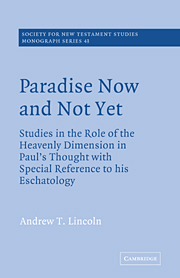 Paradise Now and Not Yet
Paradise Now and Not Yet Book contents
- Frontmatter
- Contents
- Preface
- Abbreviations and note on the text
- Introduction
- 1 Galatians and the heavenly Jerusalem
- 2 1 Corinthians and heavenly existence
- 3 2 Corinthians, the heavenly house and the third heaven
- 4 Philippians and the heavenly commonwealth
- 5 Colossians and heavenly-mindedness
- 6 Ephesians and heavenly life in the Church at worship
- 7 Heaven and the eschatological perspective in Pauline thought
- Notes
- Bibliography
- Index
7 - Heaven and the eschatological perspective in Pauline thought
Published online by Cambridge University Press: 03 November 2009
- Frontmatter
- Contents
- Preface
- Abbreviations and note on the text
- Introduction
- 1 Galatians and the heavenly Jerusalem
- 2 1 Corinthians and heavenly existence
- 3 2 Corinthians, the heavenly house and the third heaven
- 4 Philippians and the heavenly commonwealth
- 5 Colossians and heavenly-mindedness
- 6 Ephesians and heavenly life in the Church at worship
- 7 Heaven and the eschatological perspective in Pauline thought
- Notes
- Bibliography
- Index
Summary
Some of the more significant conclusions about Paul's eschatology arising from the exegesis have been summarized at the end of each chapter. This final chapter now aims to relate these and other findings to broader issues in Paul's thought and its interpretation. The further question of the contemporary relevance of Paul's views expressed in concepts so closely associated with first century A.D. cosmologies lies beyond the scope of our study but has been raised in the Introduction.
Heaven, realized eschatology and apocalyptic
Apocalyptic parallels to Paul's references to heaven
In the course of this study correspondences in apocalyptic writings to Paul's references to heaven have often been noted. This is hardly surprising since Paul was a diaspora Pharisee and apocalyptic ideas had a particularly strong influence on diaspora Judaism. In several passages we have seen links between heaven and the general apocalyptic concept of the two ages. More specifically we found apocalyptic references for the heavenly Jerusalem (Gal. 4: 26), Paradise and the third heaven (2 Cor. 12), the age to come present in heaven and entered at death (2 Cor. 5; Phil. 1: 23), the hope laid up in heaven (Col. 1: 5), the ‘hidden-revealed’ motif and the theme of glory (Col. 3: 1–4), the mystery of God's cosmic plan (Eph. 1: 10), the session in heaven (Eph. 2: 6), the heavenly temple (Eph. 2: 20ff) and the cosmic battle (Eph. 6: 10ff).
- Type
- Chapter
- Information
- Paradise Now and Not YetStudies in the Role of the Heavenly Dimension in Paul's Thought with Special Reference to his Eschatology, pp. 169 - 195Publisher: Cambridge University PressPrint publication year: 1981


